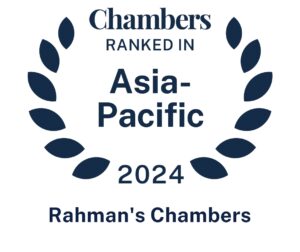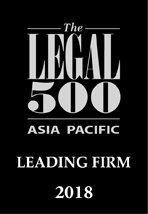
Capital Market Transactions & Disputes
Rahman’s Chambers advised high net worth individuals over legal complexity involving sponsor directorship and shareholding in listed public limited companies. Our expertise over listing regulations, security laws, baking, finance and corporate law and court matters put us in a unique position to serve client’s needs and provide the best possible practical advice. Besides, over the years the firm has advised a number of clients over share transfer of private, public and listed companies, IPO, regulation of SEC. We have in-depth knowledge over the regulation of SEC & the ability to navigate the complex regulatory regime that governs the capital market. We have handled a number of capital market related complex issues in the last few years. Chambers and Partners 2024 Asia Pacific Guide ranked Rahman’s Chambers for Corporate & Finance which include investment related works and stated: “has a recognised practice in such areas as business formation, M&A”. Chambers and Partners 2024 Asia Pacific Guide also ranked Rahman’s Chambers for Dispute Resolution and stated “Rahman’s Chambers houses a well-regarded litigation practice in Bangladesh” Their 2024 editorial added: “One source states: “They are excellent – always on time and very responsive and precise.”





Rahman’s Chambers has been ranked for Dispute Resolution for the third time, in addition to being consecutively ranked for two other Practice Areas.
– Chambers & Partners, 2021 – 2024
“…has excellent and wide exposure in his profession, and is impressive in handling legal issues with aplomb,”
– Chambers & Partners, 2020
“he is a knowledgeable and very co-operative person. I have discussed many issues with him and he gives me the right suggestions.”
– Chambers & Partners, 2019
“Their response times are excellent and they make you feel generally very well informed.”
– Chambers & Partners, 2018
“The ‘very responsible, responsive and knowledgeable’ Mohammed Forrukh Rahman heads the firm…”
– Legal 500, 2018
We have a total of one Advocate enrolled in the Appellate Division, seven Advocates enrolled in the High Court, and four Advocates enrolled in the District Court.
The firms completed or presently undertaking the following projects:
- We have conducted several due diligence for LDA Capital, involving security laws of Bangladesh, and assisted a US-based client in structuring a complex transaction involving Backstop Liquidity Facility (“BLF”). We were also involved in the negotiation of the transaction involving investment in a listed company in Bangladesh
- Our investment team advised an MNC on regulations involving the acquisition of a large shareholding of a listed company listed with DSE.
- Provided legal due diligence report to a foreign institutional investor in capital market of Bangladesh.
- In 2018, Represented a major US-based foreign institutional investor to secure its interest in investment made in a multinational company listed in the capital market of Bangladesh.
- We have acted as legal counsel for the proposed issuance of Bond for Grameen Danone Foods Limited and
- We have acted as legal counsel for the proposed issuance of Bond for First Security Islami Bank Ltd.
- We were advised the City Bank Limited in the process of financing in bond issued by Banglalink i.e. Orascom Telecom Bangladesh Limited.
- Legal action against SEC on refusal for permission in raising capital for private investment for Saturn Textiles Ltd.
- Legally assisting a shareholder of a leading listed company in a complex exit situation.
- Legally assisting a listed company in selling assets.
- Advising in raising of capital by issuance of IPO.
- Advised and assisted SEAF in a major venture capital investment recovery disputer resolution successfully
- Advised BD Venture, Venture Investment PB on several investment options and regulatory regime.
Practice Guide – Investment (Capital Market)
Capital Market in Bangladesh is constantly refining itself to achieve perfection in regulation etc. The market suffered serious blow for COVID-19. However, in recent times plenty of reforms have been made by strengthening regulations, by amending laws, issuing new rules and regulations etc. In 2018, DSE sold 25% of premier bourse to Shanghai Stock Exchange which would likely to play a more proactive role market. The promoters and large sector entrepreneur heavily rely on Capital Market for capital required for their business growth. Our Capital Market witnessed good entrepreneurship and growth of efficient local and foreign companies even in falling market. On the other hand, small investors have suffered by investing in companies who are unable to managed their investment.
Legal service is often required by sponsor/promoter in raising fund, issuing IPO and also signing different shareholding agreements etc. Large companies before raising fund from Capital Market also conduct due diligence on complex laws and regulations involving Capital Market. Foreign Institutional investor often ensure their physical present in the AGM etc. through their law firm in overseas market. Disputes involving insider dealing, dead-lock situation between share-holder, exits options, regulatory non-compliance is also common and requires expert legal assistance.
A derivative is a contract between two or more parties whose value is based on an agreed-upon underlying financial asset (like a security) or set of assets (like an index). Common underlying instruments include bonds, commodities, currencies, interest rates, market indexes, and stocks [ Source: Investopedia]. In Bangladesh the market for derivatives is under early stage of development. The very first derivative future contract concluded on- managing exchange-rate risk between the Taka and the Dollar. The country is yet to see true derivative products. Bangladesh Capital Market Development Master Plan 2012-2022 published in October 2012 by Securities and Exchange Commission states:
While derivatives tend to improve the functioning of the price discovery mechanism and provide hedging and risk management tools to financial and non‐financial firms, we recognize that their introduction should be undertaken only after their respective underlying cash markets have achieved a certain degree of maturity, otherwise, they are likely to have a destabilizing effect on the markets. Some of the issues that will need to be addressed for the introduction of derivatives in Bangladesh include the legal framework and regulatory structure governing derivatives markets, the types of derivatives that are likely to be successful in Bangladesh, the conditions under which their introduction would be advisable, and the actions that can be taken to prepare for their introduction.
After the independence of Bangladesh, the DSE had started operation with 9 listed companies. The markets saw noticeable activity in the 1990s. The regulatory environment was inadequate at that time and the market experienced its first bubble and burst in 1996-1997. This led to reform e.g. introduction of electronic trading in 1998, establishment of CDBL. After longtime, in and around 2010, DSE started to perform well. However, the market began to slow again from 2011. The Exchange Demutualization Act 2013 was passed. An Appellate Board comprising retired judges from the High Court Division was also formed to settle investor claims related to the 2010 market collapse. Surveillance software has been installed in order to maintain transparency and accountability of the markets through closer scrutiny of transactions. Both the Securities and Exchanges Commission Act 1990 and Securities and Exchange Ordinance 1969 have been amended. Financial Reporting Act 2015 passed with provisions for setting up an independent Financial Reporting Council. In recent years, corporate income tax for listed companies was lowered and rules for new stock and mutual fund issues were revised. The Central Bank redefined bank investment in the capital market. Bangladesh Capital Market Development Master Plan 2012-2022 published in October 2012 by Securities and Exchange Commission states:
We recognize that the principal challenge of the supervisory regime is related to the enforcement of the laws and regulations that are already on the books. The present situation can be characterized as one of “under‐enforcement”. This is the result of two principal factors: First, weaknesses at the SEC have pre‐ vented effective supervision of the markets and intermediaries and have hampered effective enforcement actions. A decade‐long “brain drain” coupled with the inability to recruit and train new talent has sapped the SEC’s ability to effectively regulate the securities industry. Second, the prevailing court system, in terms of time required to dispose the cases, has allowed offenders to tie up cases for lengthy periods – sometimes years, or even decades – frustrating the SEC’s enforcement efforts. We are, therefore, committed to rebuilding the SEC’s capacity to supervise the capital markets and to finding a solution to the challenge posed by the lengthy legal process…
As a regulatory agency with a principal objective of enforcing the securities laws, the lack of lawyers and qualified investigators is likely to be hindering the SEC’s enforcement capability…
Two factors significantly impede the SEC’s ability to sanction auditors who are not effectively monitoring issuers of securities. First, the SEC’s efforts to discipline auditors pursuant to 12(b) (3) of the SEC 1987 Rules have been frustrated by the requirement to refer disciplinary actions against auditors to the Institute of Chartered Accountants of Bangladesh (ICAB). A Financial Reporting Act (FRA) has been under discussion for the better part of the last decade, and we recognize that its adoption is long overdue. Initiative 41 is intended to address this matter. Second, the SEC does not have an Office of Chief Accountant; an office which can monitor the performance of accountants who practice before the SEC (i.e. who prepare and audit the financial statements of issuers of securities), and sanction them for poor performance.
Corporate debt market was introduced by Industrial Corporation of Bangladesh in 1985 in the form of a listed corporate debenture. However the later developments are not very impressive. Many publicly traded debentures defaulted on their interest payment (coupon) as well as principal obligations. Bangladesh Capital Market Development Master Plan 2012-2022 published in October 2012 by Securities and Exchange Commission states:
A well‐functioning domestic debt market is essential to the efficient allocation of capital to support rapid and sustainable growth. By facilitating the effective use of domestic savings, it reduces dependence on external borrowing for government and corporations. Bond financing is generally less expensive than commercial bank loans and can be structured to meet the needs of institutional investors. While this is generally recognized, the establishment of such markets has received inadequate attention in many countries, and Bangladesh is no exception. We recognize that private/corporate bond markets depend crucially upon a well‐functioning government bond market. A well‐developed government benchmark yield curve that accurately reflects the cost of funds at different borrowing horizons; price discovery about inflation prospects and other macroeconomic fundamentals is indispensable for pricing of private sector debt instruments. Studies have shown that in those emerging markets that do not have efficient government yield curves, the corporate bond markets are very small.
Since it is widely recognized that the development of private bond markets depends critically on the unfettered, market‐driven operation of government securities markets, we will support a number of initiatives that focus on this subject and are designed to stimulate the development of a reliable risk free yield curve. We recognize that when interest rates on government securities are suppressed, financial institutions are compelled to purchase government securities at a lower than market‐determined yield, and secondary markets lack transparency, the government yield curve is not able to signal the true level of risk free rates in the economy or accurately reflect the cost of funds at different borrowing horizons, inflation prospects and other macroeconomic fundamentals. In such a situation, pricing of corporate bonds becomes an exercise in uncertainty which significantly impedes the development of corporate bond markets. SEC is aware that Bangladesh Bank is taking measures to facilitate establishment of a reliable reference “benchmark” yield curve.
SEC has taken initiatives to reduce the costs, long delay and uncertainties associated with issuing corporate bonds and to raise market awareness. The Report says-“We recognize that one of the significant impediments to the issuance of corporate bonds has been the high level of interest rates throughout the economy. Another significant impediment to issuing corporate bonds has been the issuance process itself. Long delays in the approval/registration process often result in changes in market conditions, or in the needs of the issuer which lead to a withdrawal of the issuance application and a failed issuance effort.”
Regarding capital market investment in bond, when a company issues bonds, the bond issuer is required to pay regular interest to bondholders and repay their principal investments once the bonds mature. If a company fails to maintain the obligations, either missed interest payment or a missed principal payment, the BSEC is considering adding provision in the Debt Securities Rules, 2021, to consider the company as bond defaulter categorize bond issuers into three stages, substandard, doubtful and defaulter following the provision of defaulting borrower’s list under the Bank Company Ain 1991 with several sanctions attached to such classifications. Consequently, the “bond defaulters” list may be subject matter of judicial review and may face same issues as the CIB list or defaulting borrower’s list faces e.g., confidentiality, error reporting etc.
Mutual fund is an investment vehicle managed professionally that is made up of a pool of funds collected from many investors for investing in securities such as stocks, bonds, money market instruments and similar assets. But the share of mutual funds in Bangladesh’s capital market is very low. Here market is fully equity-based and there is little scope to introduce any new financial instrument. Mutual funds can be divided into Closed-end Fund, Open-end Fund, Unit Trust. Types of Funds by Investment Objective Stock Fund/Equity Fund, Bond Fund, Asset Allocation Fund, Exchange Traded Fund, Islamic Unit Trust. [Mutual Funds of Bangladesh: An Overview by Saifa Noor]
Mutual funds in Bangladesh can be divided into following categories: Public Mutual Fund-These are owned & managed by Investment Corporation of Bangladesh (ICB) which is government-owned investment bank, Private Mutual Fund-These mutual funds are managed by private asset management companies, Islamic Mutual Fund. A mutual fund is formed as a Trust under Trust Act, 1882 and the Trust Deed is to be registered under Registration Act, 1908. Before the registration, it has to be approved by the Securities and Exchange Commission. MFs must comply with Securities and Exchange Ordinance, 1969 and the Securities and Exchange Commission (Mutual Fund) Laws, 2001. As per BSEC directives, Net Asset Value (NAV) of the Fund shall be calculated and disclosed publicly [Mutual Funds of Bangladesh: An Overview by Saifa Noor]
There are four parties involved in floatation of a mutual fund, namely:- Sponsor – Any bank or financial institution or any other limited company who initiates the fund by subscribing minimum 10% of total fund size. The Sponsor constitutes the fund by virtue of Trust Deed; Trustee – Any bank or financial institution or any other limited company registered by the SEC to act as Trustee. The Trustee is the guardian of the fund and holds all capital assets of schemes of the Fund in trust on behalf of the unit holders; Asset Management Company – Any bank or financial institution or any other limited company registered by the SEC to act as an Asset Management Company. The Asset Management Company structures, operates and manages the schemes of the Fund approved by the Trustee and the Commission and in accordance with the provisions of the Trust Deed and the Rules; Custodian – Any bank or financial institution or depository or any other limited company registered by the SEC to act as Custodian. With special permission by the SEC the Trustee and the Custodian can be the same institution. The Custodian keeps the securities of the Fund in safe custody.
Bangladesh Capital Market Development Master Plan 2012-2022 published in October 2012 by Securities and Exchange Commission states:
In the case of mutual finds we recognize that the legal and regulatory framework governing these collective investment schemes (CIS) may be overly restrictive and constraining and commit to undertaking a comprehensive overhaul of the mutual fund rules to broaden participation (of investors as well as operators), increase the variety of mutual funds, improve protections for investors, and eliminate the preferential treatment of state‐sponsored mutual funds to remove distortions and create a level playing field between state‐owned and private sector asset management companies. We also recognize the importance of establishing a mutual fund industry association to, among other things, promote the development and professionalization of the industry.
The initiatives related to mutual fund under Bangladesh Capital Market Development Master Plan 2012-2022 are:
Ensure level playing field for all AMC and Mutual Funds (for both Govt. and private sectors)
Adopt (SEC) new legal/regulatory regime for mutual funds that broadens participation, allows introduction of different types of mutual funds, strengthens investor protections, and eliminates preferential treatment of state‐sponsored mutual funds
Assist (SEC) the mutual fund industry in structuring and registering a mutual fund association
Chanelize retail investors into institutional means (Mutual Fund/Portfolio Investment)
SEC’s main functions are: Regulating the business of the Stock Exchanges; Registering and regulating the business of stock-brokers, sub-brokers, share transfer agents, merchant bankers and managers of issues, trustee of trust deeds, registrar of an issue, underwriters, portfolio managers, investment advisers and other intermediaries in the securities market; Registering, monitoring and regulating of collective investment scheme including all forms of mutual funds; Monitoring and regulating all authorized self regulatory organizations in the securities market; Prohibiting fraudulent and unfair trade practices relating to securities trading in any securities market; Promoting investors’ education and providing training for intermediaries of the securities market; Prohibiting insider trading in securities; Regulating the substantial acquisition of shares and take-over of companies; Undertaking investigation and inspection, inquiries and audit of any issuer or dealer of securities, the Stock Exchanges and intermediaries and any self regulatory organization in the securities market etc.
Until recently, one impediment at the regulator and regulation level was the overlapping authority between the two financial market regulators, Bangladesh Bank and the Securities and Exchange Commission (SEC), and no clear jurisdiction. Most of the overlapping are now solved as venture capital, corporate governance, debt equity position etc are used to be regulated by Central Bank and these are now the function of SEC.
Bangladesh Capital Market Development Master Plan 2012-2022 published in October 2012 by Securities and Exchange Commission states:
We recognize that the principal challenge of the supervisory regime is related to the enforcement of the laws and regulations that are already on the books. The present situation can be characterized as one of “under‐enforcement”.
Second, the prevailing court system, in terms of time required to dispose the cases, has allowed offenders to tie up cases for lengthy periods – sometimes years, or even decades – frustrating the SEC’s enforcement efforts. We are, therefore, committed to rebuilding the SEC’s capacity to supervise the capital markets and to finding a solution to the challenge posed by the lengthy legal process.
Few major reform took place in last few years are:
- Amendment of the Securities and Exchange Ordinance,1969 and the Bangladesh Securities and Exchange Commission Act, 1993;
- Becoming full signatory to the IOSCO MMoU in December 2013 and elevated to Appendix-A;
- Demutualization of DSE and CSE in 2013;
- Installation of modern surveillance system at BSEC and stock exchanges;
- Amendment of Corporate Governance Guideline (CGG);
- Strengthening human resources of BSEC;
- Amendment of Securities and Exchange Commission (Mutual Fund) Rules, 2001 in 2013 and 2015;
- Promulgation of the Securities and Exchange Commission (Issue of Debt Securities) Rules, 2012;
- Establishment of a Special Tribunal on capital market in 2014;
- Promulgation of the Bangladesh Securities and Exchange Commission (Alternative Investment) Rules, 2015;
- Promulgation of new Listing Regulations of the stock Exchanges in 2015.
- Approval of new Public Issue Rules- 2015
[Source: Policies and Opportunities Under Alternative Investment Rules (Venture Financing & Private Equity) by Arif Khan FCMA CFA Commissioner, BSEC]
[Source: Digibank by DBS] Structured Products are designed to meet unique risk-return objectives. These objectives are achieved by taking conventional underlying assets and replacing their usual returns with non-traditional payoffs from other underlying assets.
Fundamentally, the returns from structured products are linked to traditional returns from underlying assets. However, they are combined with swaps, futures, and other derivative products to leverage higher participation in case of an upside or a downside. Structured Products offer the flexibility to the investors in choosing a customized payoff that typically is a combination of fixed and variable market linked return over the period of the investment suiting their own risk-return objectives with efficient tax planning.
Typical structured products have the following components
- A bond: The bond component ensures capital protection. At any point in time, if the underlying asset does not perform as anticipated, the investor gets the capital invested returned 100%
- One or more underlying equities: The underlying asset improves the return on the investment. The underlying would be a single instrument or a basket of instruments, which could be any asset class such as equity, debt, index, currency or interest rate.
- A derivative of the underlying asset: The derivatives component helps determine the overall risk in the product. The commonly used derivatives are options on the underlying asset. The derivative determines that the instrument allows investors to achieve a targeted return on investment by customizing the underlying asset classes to meet set financial goals.
Features of Structured Products
- Tenure: These products are usually long-term in nature requiring a lock-in of at least 12 months and an investment horizon of 2-3 years to gain maximum returns.
- Fees: Like any professionally managed financial instrument, structured products also attract fees that could vary.
- A mix of conventional instruments: A structured product is always an amalgamation of multiple financial instruments integrated to achieve a pre-determined goal.
- Ticket Size: Structured products require a minimum investment by an investor if invested directly.
- Risk: The risk of structured products purely varies on the way they are structured. It can range from conservative to aggressive, depending on your preference.
How do structured products work?
Let us assume we invest Tk. 100 in a straightforward, structured product offering capital protection. The investment horizon you have in mind is 3 years. Tk. 77 out of 100 is invested in a debt instrument whose value at the end of the maturity period is Tk. 100.
The remaining Tk. 23 of the amount can be employed in purchasing partially in another asset class and partially in derivative instrument. Let us say in this case, entire Tk. 23 is invested in a call option on NIFTY. You pay a premium to buy a call option on NIFTY at the end of three years at the current price. You buy two options as the premium is priced at 11.5 giving you access to two times the NIFTY returns at the end of the duration.
At the end of the tenure, the debt portion of the investment has matured to Tk 100. The NIFTY generated 20% returns over the three-year window. These returns imply that the call option reaps Tk. 40. The total return on the maturity of the structured product is Tk. 140. However, if the NIFTY falls below the level of investment made today, no value is returned from the derivative and the fund generates only Tk. 100 with the capital protection clause.
Thus, in this illustration, if there was no capital protection clause and the underlying derivative lost value, the investor could also lose the principal money invested. In this case, there is a notional loss of interest which the investor could have earned by investing in any other instrument for the same tenure.
Advantages
- Highly Customizable: The product is designed to be customized uniquely for you.
- Meet Varied Objectives: Structured products can be tailor-made to achieve your unique products. Be it growth, income, or a combination of both.
- Monetize Market Views: You, as an investor, have the flexibility to customize a product that lets you benefit from your particular market views. Structured products are exceptional products to maximize from your ability to predict markets.
- Choice of capital protection: You could also benefit from the capital protection clause by choosing such structured products.
Things to Keep in Mind
- Complex Instruments: Remember that Structured Products are complex. They are an integration of varying risk-bearing instruments including derivatives. As an investor, you must understand the inherent risks to the investment.
- Not Liquid: Unlike other liquid instruments, structured products are not liquid. Given their intrinsic nature, they are not traded in the secondary market and are hence, not liquid. You should have accessible funds without relying on your structured products investments in case of any emergency. As an investor you should intend to hold the structure till maturity.
- Risk Tolerance: Before investing in structured products, you must assess your tolerance level for risk and how much money you would be comfortable losing. Are you dependent on the income generated from structured products, or is it just the benefit from the upswing?
- Credit Risk: The 100% return of principal at maturity is subject to the credit risk of the issuer of underlying debenture. The overall demand for the Issuer’s products is linked to various micro and macro economic parameters like GDP growth, business cycles, liquidity, etc,. Any adverse movement in these factors will have an adverse impact on the business of the Issuer and ultimately on the credit profile of the issuer.
[ Source: Economic Times by Indian Times] Securitization is a process by which a company clubs its different financial assets/debts to form a consolidated financial instrument which is issued to investors. In return, the investors in such securities get interest. This process enhances liquidity in the market. This serves as a useful tool, especially for financial companies, as its helps them raise funds. If such a company has already issued a large number of loans to its customers and wants to further add to the number, then the practice of securitization can come to its rescue.
Bangladesh Capital Market Development Master Plan 2012-2022 published in October 2012 by Securities and Exchange Commission states:
Asset securitization has been tried in Bangladesh with limited success. The current legal framework and tax code make it difficult to achieve a “true sale” status in securitization transactions, and thus to achieve “bankruptcy remoteness”, and to enable the removal of the securitized assets from the issuer’s balance sheet, two of the principal objectives of asset securitization. Without these, issuers cannot achieve the full effects and benefits of asset securitization.
We recognize that because of ambiguities in the law, asset securitization remains under a cloud of uncertainty, requiring a risk premium in the pricing of such transactions that makes them less attractive. We commit to reform the legal regime for asset backed securities to allow for the “true sale” status of assets transferred in connection with a securitization, and to remove the legal ambiguities with respect to the “bankruptcy remoteness” of such transactions.
Bangladesh Capital Market Development Master Plan 2012-2022 states the initiative taken for this purpose are: Reform (Govt.) legal/regulatory regime for ABS to include, “true sale” status of transferred receivables, SPV as “pass‐through” entity, “bankruptcy remoteness” of transaction.
Venture capitalists provide funds to start up companies at the time of formation or at very early stage by taking equity position in the company. Venture capitalists are patient, long-term investors who are willing to take entrepreneurial risks alongside the founders. Private Equity firms are partnerships, Limited Liability Companies (LLCs) or corporations that pool private investment from individuals, pension funds, endowments etc. and then use that cash to invest in or wholly buy companies. Private Equity firms perform critical role in a free market economy.
In addition to funding, ventures investors also instill lots of ingredients including continuous R&D, strong governance, ability of withstand in certain market etc. Venture investors fund ground breaking ideas in good times and bad- constantly transforming single ideas into economic growth. PEs take part, normally, a later stage and also provides valuable guidance all the way to convert the company a sound and profitable business.
Bangladesh Securities and Exchange Commission (Alternative Investment) Rules, 2015 came into effect on June 22, 2015 paving the way forward to channelize required funds for small and medium start up or early stage companies in equity form. The key features of the rules are:
- It has to be company or statutory body with minimum paid up capital of BDT 50 million
- An asset management company is also eligible to run alternative investment funds if it has additional paid up capital of BDT 50 million above its normal regulatory capital requirement
- Maintains adequate financial, technical, infrastructural and organizational facilities and human resources
- A fund manager must manage the fund in accordance with the Informational Memorandum and applicable Rules, notifications, guidelines and directives
- Act within an “Investment and Fund Management Guidelines” with the approval of trustee
- Disseminate NAV per unit of the fund semi-annually to the unit holders, the Trustee and the Commission
- Ensure transparency and disclosure of information to investors
- Minimum fund size shall be at least BDT 100 (one hundred) million and sponsors contribution is not less than 10% (ten percent)
- Tenure may be from 5 (five) to 15 (fifteen) years
- At least 75% of the fund corpus shall be invested in non-listed securities of portfolio companies
- An alternative investment fund shall declare only cash dividends
[Source: Policies and Opportunities Under Alternative Investment Rules (Venture Financing & Private Equity) by Arif Khan FCMA CFA Commissioner, BSEC]
One of the principal impediments to the effective enforcement of securities laws and regulations in Bangladesh is the court system itself. Cases may drag on for years and sometimes decades in the court system. There were reportedly a large number of securities cases pending in the court system as today, some of which stem from the stock market crash of 1996. Part of the problem is that ordinary court dockets are seriously overcrowded, resulting in cases not being heard for months or even years. A second part of the problem is that defendants can sabotage the enforcement process by filing endless appeals.
Our services includes
- Public and Private Securities Offerings.
- Initial public offerings (IPO).
- Securities Law and Corporate Governance.
- Further Issuance.
- Transfer of Shares and related Disputes.
Related Resources - Library
We have a rich library with a mixture of printed and online legal databases. We have printed version of All England Commercial Cases, Indian Digest of Supreme Court cases, Yearbook Commercial Arbitration of Wolter Kluwer and most law reports of Bangladesh. We subscribe to the online legal database Manuputra providing access to most reputed law reports. Read more


